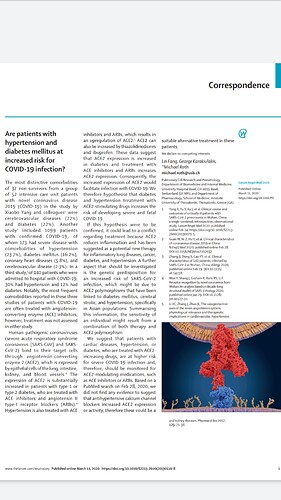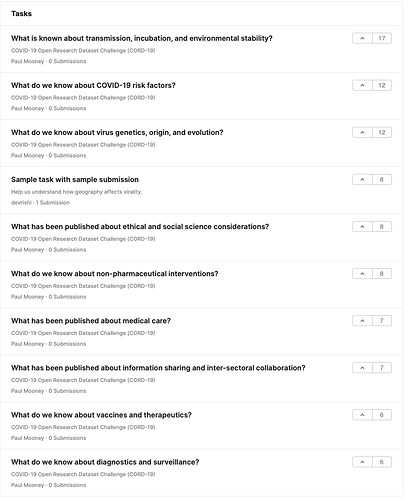One question to try to answer in the study-a-thon: Does evidence support that taking anti inflammatories can cause adverse outcome?
@Michael_Shamberger, I was also wondering this.
Apparently this information is based on a hypothesis from a Lancet Correspondence (see attachment). The correspondence talks about evidence from prior studies about ACE inhibitors being a risk factor for Covid-19 infection. Furthermore, they speculate about ibuprofen (and thiazolidinediones) also upregulating ACE2 and therefore being also risk factors.
However it seems, @Patrick_Ryan, that the study questions are set?
Another thought of mine was on clustering patients with severe covid-19 progression. There seems to be certain groups that are rather affected or have worse outcomes of Covid-19. But what if we are missing a certain (smaller) group that we would not think of? This is highly speculative and not sure whether it is possible with OHDSI tools, but I thought that would be also an interesting aspect.
There has been vexed discussion over decades over the merits of anti-pyretics and anti-inflammatories with regards to fever and infection.
For instance this study from 1990: https://www.ncbi.nlm.nih.gov/pubmed/2172402
Some would argue that inhibiting normal immunological response with OTC drugs not warranted, and indeed immunological efficiency at higher body temperature is well understood. Impacting on abnormal immunological responses is another matter of course.
In France they have allegedly seen younger cases who took ibuprofen, vs. the usual older population.
Again, looking at all concomitant medications may prove very useful in terms of any incidental findings, but OTC and illicit drugs, such as cannabis, will likely not be available in clinical record data.
I’ve added this question to the github.
In my previous experience related with H2-blockers, we could identify substantial number of patients using OTC drugs in OHDSI network, though it might not cover the most (https://data.ohdsi.org/RanitidineCancerRisk/).
OTC drugs can be prescribed in the US. They are not always paid for by the insurance, but the prices are low anyway and comparable to the co-payments.
I saw this statement from the ISH which is of relevance: https://ish-world.com/news/a/A-statement-from-the-International-Society-of-Hypertension-on-COVID-19/
although could well still be an interesting question as my reading is there is a lack of evidence rather than evidence to disprove the theory
Via https://infoviewer.infodesk.com/infodisplay/article/80cb16dd-72d6-4ab6-a55c-7b33dd163a38.html
Trials Begin of Existing Drugs as Potential Coronavirus Treatments
Last Modified: 05:06 PM, Mon Mar 16, 2020
16 March 2020
Word Count: 409
( Reuters ) Drugs used for treating arthritis are being trialed as treatments for people who have caught the coronavirus, as private companies and scientific researchers rush to find ways of helping patients and slowing infection. Sanofi and Regeneron Pharmaceuticals said on Monday they had begun a clinical trial of their rheumatoid arthritis drug Kevzara as a coronavirus treatment, while in Spain a separate trial is studying if a combination of two drugs can slow down the spread of coronavirus among humans.
(Updates with details on clinical trials in Spain)
March 16 (Reuters) - Drugs used for treating arthritis are being trialed as treatments for people who have caught the coronavirus, as private companies and scientific researchers rush to find ways of helping patients and slowing infection.
Sanofi and Regeneron Pharmaceuticals said on Monday they had begun a clinical trial of their rheumatoid arthritis drug Kevzara as a coronavirus treatment, while in Spain a separate trial is studying if a combination of two drugs can slow down the spread of coronavirus among humans.
Enrolments for the mid-to-late stage trial of Kevzara, an infection-fighting protein known as a monoclonal antibody, will begin immediately and test up to 400 patients, Sanofi and Regeneron said in a joint statement.
Regeneron in February announced a partnership with the U.S. Department of Health and Human Services to develop a coronavirus treatment, and had said it would focus on monoclonal antibodies.
Meanwhile, Barcelona-based researchers said on Monday they would administer a drug used to treat HIV - containing darunavir and cobicistat - to a coronavirus-infected person. The patient’s close contacts would be administered hydroxychloroquine, a drug for malaria and rheumatoid conditions, such as arthritis.
"The goal of our study is to separate the transmission chains," Oriol Mitja, researcher at Germans Trias i Pujol Research Institute, told a news briefing.
Patients with coronavirus can infect between 5% and 15% of the people they come into contact with during the 14 days after starting to show symptoms, he said.
The trial’s goal is to reduce that number below 14 days and also to reduce the percentage of contacts infected and researchers plan to analyze the results in 21 days.
Around 200 patients with coronavirus and 3,000 of their close contacts will take part in the trial, which has private and public funding.
Mitja - who plans to talk with World Health Organization officials this week - said there were two other similar projects in Australia and the United States, but that his is in the lead.
Also on Monday, Madrid’s La Paz-Carlos III hospital announced another trial to administer Remdesivir, a drug similar to a nucleotide and intended to fight viral replication, to voluntary patients with serious and milder cases of coronavirus, Madrid’s regional government said in a statement.
About 1,000 patients will take part in the European-wide trial, it said. (Reporting by Manas Mishra in Bengaluru and Joan Faus in Barcelona; Editing by Sriraj Kalluvila and Alexander Smith)
First of all, great initiative! The knowledge and reach of the OHDSI community are enormous, which is very valuable in this critical COVID-19 period.
For everyone to benefit from the outcome of this study-a-thon, it is important to publish the data and the results in a FAIR (Findable, Accessible, Interoperable, Reusable, https://www.go-fair.org/fair-principles/) compliant manner. The OMOP CDM itself already ensures interoperability, and by focussing on the other FAIR principles as well we could maximize the value of the study-a-thon output and help decision makers and other stakeholders navigate the data.
We (The Hyve) would like to offer our services, if beneficial for this study-a-thon, to help to publish the output of this study-a-thon in a FAIR way. In light of the current EHDEN project, this fits the EHDEN FAIR roadmap The Hyve is currently involved in.
In the Accrual of patients to Clinical Trials (ACT) network, we are starting to collect new and old codes for Covid-19 to build an ontology. See https://github.com/shyamvis/covid-phenotyping and https://github.com/shyamvis/covid-phenotyping/blob/master/codes.md
Dear Friends,
Odysseus is standing up the COVID-19 OHDSI/OMOP response team that can help institutions and organizations with converting their data into OMOP CDM format to assist with the upcoming COVID-19 studies. We do not have a lot of time left until March 26 - it is given - but let’s think about beyond that, it is long term. We will need to have data available not just for this study-a-thon but many months after that as well. If you need help with converting your data to support COVID-19, please reach - we will help. We will figure out the funding later lets first get the data and evidence in place. Also, please reach out for any collaborations well - the more the merrier
Dataset from Johns Hopkins University Center for Systems Science and Engineering - https://github.com/CSSEGISandData/COVID-19
Two things:
- Is there any way we could leverage our China OHDSI network to understand their willingness to use the China hospital data?
- Could we be looking into things like Length of Stay or 30 Day mortality in patients hospitalised with viral pneumonia to understand patterns of antiviral use and potential differences in endpoints?
Looking forward to contributing towards this effort
Working on that.
Exactly. Will create alternative outcome cohorts (= endpoints) and study potential discrepancies.
The registration form says that no further registrations for the study-a-thon are possible  is that correct or a technical error?
is that correct or a technical error?
I have the same question since it is being locked. How to contribute to the StudyAThon?
I would also like to be able to contribute terminology support from CIEL if it is still possible. I am coordinating with other COVID response, but would like to be able drop in to help out on the ETL or terminology challenges.
It seems that Google form is not active any more. Is that intentional? Is there still a way to join on March 24?
Hi @ZKostic, unfortunately, registration has closed on the study-a-thon. However, this is only the beginning of OHDSI’s research agenda around the COVID-19 pandemic. You can get a sense of the planned studies from this recent forum post, and then follow along on the forum, our COVID-19 updates page, or on our Twitter or LinkedIn feeds. We hope you will consider collaborating with our community on the many future efforts to support healthcare decision-making.
Best,
Craig

